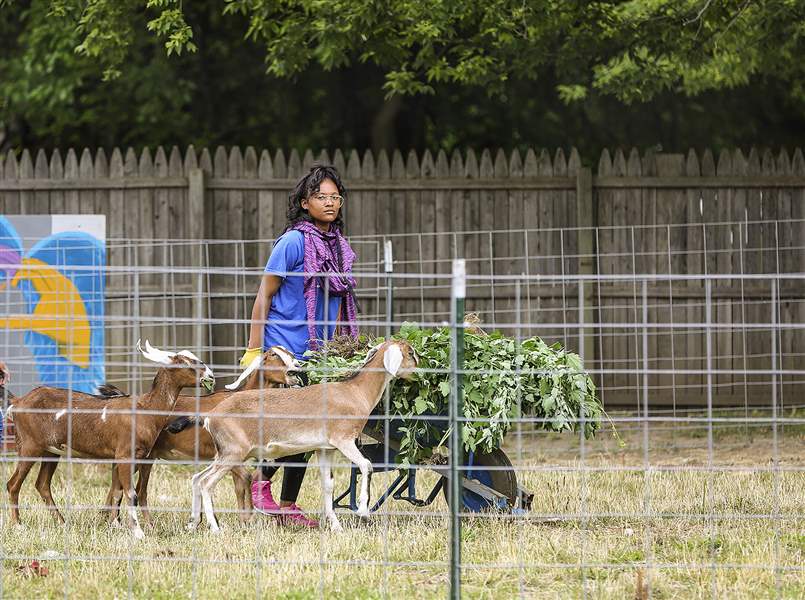
Farming expands beyond country folk
9/5/2017
Jayla Davis, 15, Bowsher High School, wheels a load of weeds the youths just picked to the goats for feeding.
THE BLADE
Buy This Image

Growing a few vegetables in pots on your deck has become a popular hobby for many people.
You don’t have to have a few acres of land to enjoy fresh fruits and vegetables, and green thumbs can come in all sizes. I am an Advanced Master Gardener, and I really enjoy learning more about how things grow. Master Gardening isn’t just for country kids.
No matter if your space includes a few backyard raised beds or a hydroponic operation, the Ohio Master Urban Farmer Program is more tailored to gardening in close quarters with acres of concrete on the horizon. The class teaches how things grow, what diseases they are up against, and how to fend off those pests in small spaces in urban areas.
The class is a partnership between the Ohio State Extension, Lucas County, and Toledo GROWs.
“This series of nine evening workshops is designed to help individuals learn how to produce and market a variety of food in urban settings,” said Lee Richter, OSU Extension agent. “This food could be produce, animals, honey, hops, and more. The Ohio Master Urban Farmer Program was developed by OSU Extension as an outgrowth of planning for part of the new Extension in The City program.”
The Master Urban Farmer Program began in Franklin County, said Amy Stone, OSU Lucas County Extension educator.
“The idea was to bring together folks who are interested in producing food in a more urban situation, rather than in a traditional rural site,” she said.
Just like the Master Gardener program, Ms. Stone said the Urban Farmer students will learn about soils, integrated pest management, plant growth, animal husbandry from the technical side, site consideration, the land bank, business planning, and keeping it legal from the business side, and good agriculture practices from the safety side. Student will hear from experts in the field.
“We all need food, [so] why not grow it locally and support our local community?” Ms. Stone said. “As growers or producers we need to make sure we are doing it right, being good stewards of the land, and implementing good safety practices.”
Master Gardeners and Urban Farmers learn many of the same things. Master Gardeners focus more on perennial and annual flowers, while the urban farmer might dive into intercity specifics like hydroponics and community gardening. The main difference between the Master Gardening and Urban farming is volunteer hours. Master Gardeners are required to volunteer in their local community to fulfill their status. In my experience, I’ve met new people who like to do the same things and we share ideas and even plants.
The Urban Gardener program doesn’t require program does not have a volunteer requirement.
“Even if you are growing food for your family, or are interested in growing food for this purpose, there are things that you would be able to pull from the series,” Ms. Stone said.
The 10-week class is from 6 to 9 p.m. Thursdays, beginning Sept. 14. The final class is Nov. 16. Look for the Ohio State and Michigan State Master Gardener Program to start after the first of the year.
The cost of the Urban Farmer program is $100 and includes a course materials, light refreshments each evening, and a Good Agriculture Practices Certificate of Completion and a Certificate of Completion for the course. Contact Lee Richter at richter.71@osu.edu or at 419-578-6783 for information about scholarships or the program.
If you ask me, it is well worth every penny and minute spent.
Contact Kelly Heidbreder at getgrowing@gmail.com